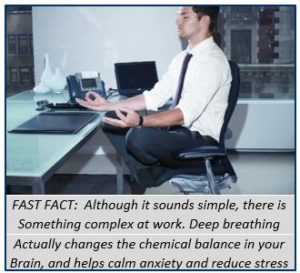According to the American Psychological Association (APA), stress in the workplace has become a major drain on the American worker and a source of a variety of health challenges. The APA’s annual Stress in America survey identifies the workplace as one of the main sources of stress for many Americans. The organization recommends that individuals keep a journal for a few weeks to identify and track stress points. This is a first step in fighting stress and its effect on the mind and body. Noting responses to stressful situations in a journal can help individuals find healthier ways to respond to the people or circumstances causing the stress.
 Stress can take a toll on health and wellbeing in a number of ways including:
Stress can take a toll on health and wellbeing in a number of ways including:
- Headaches
- Stomach ailments
- Short temper
- Difficulty focusing
- Insomnia
- Substance abuse
Stress can also lead to serious health conditions such as:
- Anxiety
- High blood pressure
- Depression
- Obesity
- Weakened immune system
The Mayo Clinic recognizes work stress as a cause of numerous health issues in America and recommends several coping strategies.
Time Management
Never  having enough time in the day to accomplish all that is required is one of the top challenges faced in the workplace each day. Managing time more effectively is the best way to get the most out of each day.
having enough time in the day to accomplish all that is required is one of the top challenges faced in the workplace each day. Managing time more effectively is the best way to get the most out of each day.
Setting realistic goals, expectations and deadlines, and sticking to a well-thought out plan can help alleviate stress by increasing productivity during the work day. Working with supervisors to establish goals, scheduling progress reviews and adjusting goals as necessary are good ways to stay on track to meet deadlines.
Along with setting goals, keeping a priority list and checking off each completed tasks gives a sense of accomplishment and eases stress. Important projects require uninterrupted concentration, and that means blocking out time to focus completely on the projects without checking emails or taking phone calls. Breaking large projects into smaller steps helps to make the task less overwhelming and stressful.
The Impact of Diet on Stress
Watching the diet carefully has more impact on stress levels than many people realize.
Just avoiding these top 5 stress causing foods can make a noticeable difference in anxiety, stress, moodiness and energy level.
- Refined Sugar causes blood sugar levels to fluctuate which contributes to feelings of anxiety.
- Artificial sweeteners can cause headaches, mood swings and cravings for more sugar.
- Processed carbohydrates have no nutritional value, and tend to cause blood pressure to increase which adds to stress symptoms.
- Alcohol can promote relaxation in small amounts. One glass of wine is usually not harmful, but more than that causes disruption in sleep patterns.
- Caffeine in excess overstimulates the adrenal glands causing a rise in heart rate and blood pressure.
5 Stress-Busting Snacks for the Office
- Blueberries contain antioxidants and phytonutrients which help improve the body’s response to stress, and boosts the immune system. That makes these berries a delicious pick me up in the afternoon.
- Pistachios have heart-health benefits and tend to reduce blood pressure and heart rate which in turn lowers stress levels.
- Dark chocolate has been shown to reduce the stress hormone cortisol, and the antioxidants in cocoa trigger the blood vessels to relax which improves circulation.
- Seeds high in magnesium, such as flaxseed, pumpkin seeds and sunflower seeds, help alleviate depression, fatigue and irritability.
- Cashews are loaded with zinc, a mineral that studies have shown reduces anxiety. As a bonus, cashews are rich in Omega-3s and protein.
Take a Break
It may seem like the average overworked employee does not have time for a break, but in reality taking a break boosts energy levels and increases productivity. There are several break-time activities that can reduce stress and promote overall well-being.
 The Importance of Deep Breathing
The Importance of Deep Breathing
Energy levels, in part, depend on breathing, and practicing deep breathing exercises can improve the energy level by bringing more oxygen into the body. Deep breathing contributes to stress reduction and improved digestion – both of which are vital for a healthy immune system. In addition, deep breathing exercises enhance the mind’s ability to focus and concentrate. Exercises are simple. Inhale for 5 seconds, hold for 3 seconds, exhale for 5 seconds. Repeat 10 times. It is surprising how refreshing just a couple of minutes of deep breathing can be in the middle of a busy day.
In conjunction with deep breathing, there are a wide variety of meditation applications available for Smart Phones. The daily meditation activities, lasting 10-15 minutes per day, can be done before leaving for work or during a lunch period or break. A brisk walk for 30 minutes per day, during lunch time or before work, while practicing deep breathing, has also been shown to reduce blood pressure and improve circulation, both of which contribute to stress reduction.
Pausing for 15 minutes each day to practice yoga at your desk reduces stress, improves flexibility and boosts energy. There are yoga poses that can be done while sitting in a chair at a desk. The Cleveland Clinic promotes 12 yoga poses that can easily be done at work during a 15 minute break. https://health.clevelandclinic.org/12-yoga-poses-can-work/
Other stress reducing helpers include herbal teas and air-cleaning plants. Teas containing Chamomile, Ginseng, Kava and Lavender are known for their calming effects on the body and mind. Small desk plants like Lemon Balm, Golden Pothos, Philodendron and Spider Plants actually have the ability to clean the office air, according to studies conducted by NASA. These kinds of plants remove VOCs (Volatile Organic Compounds), which are unhealthy chemicals commonly found in office buildings.
Work schedules are not likely to get easier; therefore finding ways to cope with stress in the work place is essential for maintaining good health and peace of mind.


